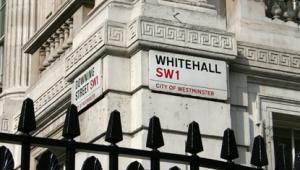By Richard Johnstone | 17 February 2012
The government is set to secure £5bn in efficiency savings this year, Cabinet Office minister Francis Maude has revealed.
Tough government controls on property, procurement, ICT and staffing have already saved £3.25bn in cash in 2011/12, Maude said yesterday. The savings will help Whitehall departments live within the tighter budgets set at the 2010 Comprehensive Spending Review.
This follows a National Audit Office report earlier this month, which confirmed that initiatives by the Cabinet Office’s Efficiency and Reform Group had succeeded in cutting government spending by £3.75bn in 2010/11.
One of the biggest savings so far this year is £1.1bn cut from spending on consulting and temporary agency staff.
A further £800m has been saved by cutting the size of the civil service to its lowest level since the Second World War. Staff numbers have been cut by 43,000 since June 2010.
Maude said that the figures showed the success of a ‘new business-like approach’ to government spending.
He added: ‘For the first time, like any large business, we now have an effective operations centre at the heart of government – one that will keep delivering savings for the taxpayer year after year. We always knew that change of this scale would not always be easy or popular, but it was necessary and I believe today’s figures will show once and for all that the sceptics were wrong.’
However, the Public and Commercial Services trade union, which represents civil servants, accused Maude of ‘boasting about sacking people’.
General secretary Mark Serwotka said the comments were ‘distasteful and economically illiterate’.
He added: ‘His “savings” are loyal public servants and their families who have been thrown into poverty and fear by the government. Unemployment is rising, and across the UK high street shops are closing because of the job cuts and pay freezes the coalition is imposing.’
Maude also revealed that £130m has been saved so far in 2011/12 through better deals on lease renewals for government buildings, and cutting the size of the property estate.
Earlier this week, a survey by consultancy Deloitte revealed that, across the public sector, 552 properties with nearly 440,000 square metres of space lie vacant. A further 100,000 square metres is expected to become vacant.
Mike Turley, head of Deloitte's public sector practice, said that public spending cuts represented ‘a golden opportunity’ to put public sector asset management on the right path.
He added: ‘The government’s property portfolio is a patchwork of assets and liabilities and a significant cost item on balance sheets. Some departments have occupancy rates as low as 40% and, based on current projections, there will soon be enough empty workspace in the public sector to fill London’s Shard building nearly five times over.’
The Department for Communities and Local Government has introduced a place-based approach to asset management, which aims to rationalise the public sector estate so there are fewer but better quality buildings.
But Deloitte warned that more collaboration is needed within public sector organisations to ensure that estate strategies reflect current and future needs.



The government is set to secure £5bn in efficiency savings this year, Cabinet Office minister Francis Maude has revealed.
Tough government controls on property, procurement, ICT and staffing have already saved £3.25bn in cash in 2011/12, Maude said yesterday. The savings will help Whitehall departments live within the tighter budgets set at the 2010 Comprehensive Spending Review.
This follows a National Audit Office report earlier this month, which confirmed that initiatives by the Cabinet Office’s Efficiency and Reform Group had succeeded in cutting government spending by £3.75bn in 2010/11.
One of the biggest savings so far this year is £1.1bn cut from spending on consulting and temporary agency staff.
A further £800m has been saved by cutting the size of the civil service to its lowest level since the Second World War. Staff numbers have been cut by 43,000 since June 2010.
Maude said that the figures showed the success of a ‘new business-like approach’ to government spending.
He added: ‘For the first time, like any large business, we now have an effective operations centre at the heart of government – one that will keep delivering savings for the taxpayer year after year. We always knew that change of this scale would not always be easy or popular, but it was necessary and I believe today’s figures will show once and for all that the sceptics were wrong.’
However, the Public and Commercial Services trade union, which represents civil servants, accused Maude of ‘boasting about sacking people’.
General secretary Mark Serwotka said the comments were ‘distasteful and economically illiterate’.
He added: ‘His “savings” are loyal public servants and their families who have been thrown into poverty and fear by the government. Unemployment is rising, and across the UK high street shops are closing because of the job cuts and pay freezes the coalition is imposing.’
Maude also revealed that £130m has been saved so far in 2011/12 through better deals on lease renewals for government buildings, and cutting the size of the property estate.
Earlier this week, a survey by consultancy Deloitte revealed that, across the public sector, 552 properties with nearly 440,000 square metres of space lie vacant. A further 100,000 square metres is expected to become vacant.
Mike Turley, head of Deloitte's public sector practice, said that public spending cuts represented ‘a golden opportunity’ to put public sector asset management on the right path.
He added: ‘The government’s property portfolio is a patchwork of assets and liabilities and a significant cost item on balance sheets. Some departments have occupancy rates as low as 40% and, based on current projections, there will soon be enough empty workspace in the public sector to fill London’s Shard building nearly five times over.’
The Department for Communities and Local Government has introduced a place-based approach to asset management, which aims to rationalise the public sector estate so there are fewer but better quality buildings.
But Deloitte warned that more collaboration is needed within public sector organisations to ensure that estate strategies reflect current and future needs.





















